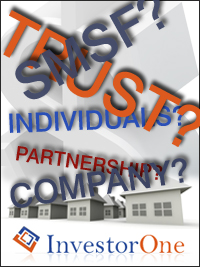The majority of people use the wrong investment structure when acquiring investments. Many people poison their own rental properties by acquiring them in their own name. The material in this section looks at:
|
Overview
The most important decision when deciding to make an investment is what structure should be used to hold the investment. The majority of people acquire property, shares and managed funds in their own name which provides for no asset protection or flexibility regarding taxation or stamp duty.
A number of crucial factors need to be considered when reviewing what type of structure including individual, partnership, company or trust should be used including:
- Who should receive income, both now and in the future? This is crucial as the high income earner is best to own the asset for negative gearing purposes but not when the income is positive.
- Who should have the right to receive capital, both now and in the future?
- Should the asset be protected against possible future creditors?
- What ability exists to convert equity to debt in the future?
- Are there statutory requirements governing what structure should own the investment?
- Are there family concerns as to who should own the asset or receive income from it in the future?
|
| |
| Individuals
Despite being the most common form of investment this should be restricted in the majority of cases to ownership of the family home and holiday home. Investing this way offers no protection from future potential creditors. No flexibility exists regarding the distribution of income and capital gains. Investors should consider other options before investing in their own name.
|
| |
| Partnerships
Partnerships also offer little in the way of asset protection and flexibility regarding the distribution of income and capital gains. This should also be restricted to ownership of the family home and holiday home.
|
| |
| Companies
Companies offer little in the way of asset protection. If the shares are owned by individuals the asset protection is the same as for individuals. The limited liability that attaches to companies is only relevant if the company is sued. This only happens with companies that trade and not where a company holds a passive investment. Income is taxed in the first instance at 30% with the balance payable later when dividends are declared. Not an advisable structure for the holding of appreciating assets.
|
| |
| Trusts
Trusts offer the most in terms of asset protection and flexibility of income and capital gains. If the terms of the trust are discretionary then income and capital gains may be distributed amongst a range of beneficiaries. Trusts offer more benefits than any of the previous structures.
|
| |
| Self Managed Superannuation (SMSF)
SMSF's are the fastest growing investment structure due to compulsory super and the ability for them to borrow and invest in property. With tax rates ranging from 15% to 0% they are fast becoming a popular investment vehicle.
|
| |
